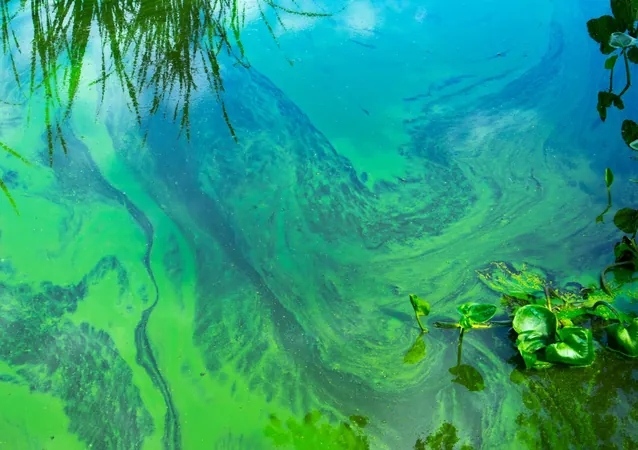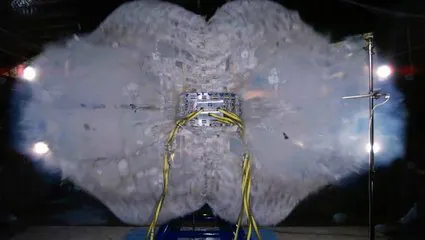
Discovering "Chonkus": The Algae That Could Revolutionize Carbon Capture!
2024-11-05
Author: Jia
Introduction
An international team of scientists has made a groundbreaking discovery that could change the way we combat climate change. Off the Sicilian island of Vulcano, researchers have identified a new strain of cyanobacteria affectionately dubbed "Chonkus," which thrives on carbon dioxide (CO2) and grows abundantly in carbon-rich waters influenced by volcanic activity.
Research Background
The team, led by Dr. Max Schubert, has been studying this unique alga to understand how it operates in an environment where CO2 is plentiful. "Dissolved carbon in the ocean is typically at very low concentrations, which limits the growth of photosynthetic organisms," explains Dr. Schubert. "By removing those limitations, we discovered that some organisms have evolved to utilize CO2 to accelerate their growth."
Discovery Process
The journey to uncover Chonkus began nearly a decade ago when Dr. Schubert worked alongside Dr. Braden Tierney at Harvard Medical School. Their focus was initially on directed evolution of bacteria. However, following a proposal win during the HMS Consortium for Space Genetics Symposium on Climate Change in 2019, Dr. Schubert diverted his attention towards cyanobacteria. Collaborating with Italian scientists from the University of Palermo, they launched an expedition that saw scientists from institutions such as MIT and the National Renewable Energy Laboratory converge in Vulcano’s carbon-rich waters.
Isolation and Characteristics
After collecting water samples and recreating optimal growth conditions in their Boston lab, the researchers isolated the unique Chonkus strain, known formally as UTEX 3222. This organism exhibits rapid growth and is characterized by its carbon-storage capabilities and tendency to sink quickly, features that offer enormous potential for industrial applications.
Industrial Applications
Among the applications being explored, Chonkus could play an essential role in carbon sequestration. "The traits we've observed in Chonkus can be incredibly valuable in industrial settings, allowing for higher densities of growth that effectively sequester more carbon while producing valuable compounds," says Dr. Tierney.
Biomanufacturing Potential
The implications of this research extend beyond merely absorbing CO2. Chonkus has the potential to efficiently produce commodities such as omega-3 fatty acids, the antioxidant astaxanthin, and spirulina, a popular dietary supplement. By merging carbon capture with biomanufacturing processes, researchers envision a sustainable model that addresses climate change while providing economically valuable products.
The Two Frontiers Project
To further explore and harness these possibilities, the researchers have established a non-profit organization, The Two Frontiers Project. This initiative aims to study life forms in extreme environments, advancing efforts in carbon capture, CO2 upcycling for sustainable products, and coral ecosystem restoration.
Expert Opinions
Dr. George Church, a leading figure in the field, advocates for the significance of sustainably utilizing naturally evolved organisms like Chonkus. "Maintaining control over such experiments is crucial," he stresses.
The research team’s approach aligns with a broader strategy of looking to nature for innovative solutions to climate challenges. Dr. Don Ingber, founding director of the Wyss Institute, emphasizes the importance of this philosophy. "This is a perfect example of how out-of-the-box approaches can confront climate change—arguably the biggest challenge of our generation," he reflects.
Conclusion
With studies published in *Applied and Environmental Microbiology*, the implications of Chonkus are vast and exciting, presenting a promising avenue for sustainable practices in an era where innovation is urgently needed.
Future Perspectives
Stay tuned as this story unfolds, and explore the incredible possibilities that Chonkus and similar organisms hold for the future of our planet!




 Brasil (PT)
Brasil (PT)
 Canada (EN)
Canada (EN)
 Chile (ES)
Chile (ES)
 España (ES)
España (ES)
 France (FR)
France (FR)
 Hong Kong (EN)
Hong Kong (EN)
 Italia (IT)
Italia (IT)
 日本 (JA)
日本 (JA)
 Magyarország (HU)
Magyarország (HU)
 Norge (NO)
Norge (NO)
 Polska (PL)
Polska (PL)
 Schweiz (DE)
Schweiz (DE)
 Singapore (EN)
Singapore (EN)
 Sverige (SV)
Sverige (SV)
 Suomi (FI)
Suomi (FI)
 Türkiye (TR)
Türkiye (TR)